TOPICS
2024
2024.06.26

My first time living abroad alone, I discovered my potential at Ritsumeikan University through a for-credit internship and the Figure Skating Club.(YBUAN Karla Alexis)
2024.06.18
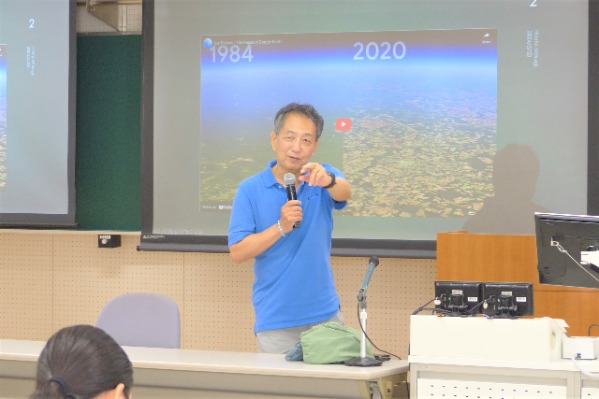


more
Report on the guest lecture (Mr. Hiroto MITSUGI, assistant director-general of the Food and Agriculture Organization (FAO) of the United Nationsin the headquarters)
Mr. Hiroto MITSUGI, who served as an assistant director-general of the Food and Agriculture Organization (FAO) of the United Nations in the headquarters of Rome for four and a half years until December 2020, delivered a special lecture on the FAO’s missions and activities on June 18, 2024, in Professor Sachiko ISHIKAWA’s Kokuren-Nyuumon (Introduction to the United Nations) course.
At the beginning of the lecture, students watched a YouTube video about deforestation in the last 50 years, learning the reality that environmental destruction has progressed faster than anticipated. While forests cover one-third of the land on the globe, the statistics show that deforestation is particularly prevalent in Africa and South America.
Mr. Mitsugi stated that Asia’s forests are growing as a result of China’s reforestation efforts.
He also demonstrated the current situation in which deforestation occurs as a consequence of increased production of cacao, coffee beans, rubber, palm oil, and other commodities in order to secure more land for planting them.
Mr. Mitsugi then explained the FAO’s missions and activities. The FAO analyzes the data on global food and agriculture, develops guidelines based on global standards, and conducts monitoring.
The FAO additionally undertakes technical cooperation and capacity development projects.
In terms of the current global food crises becoming acute, Mr. Mitsugi discussed the research that shows that conflicts, poverty, and climate change are key drivers of the problem. Mr. Mitsugi stated that the food crises caused by the Ukraine-Russia war has passed its peak; however, farmlands in Ukraine have been destroyed due to land mines strewn throughout the country.
The FAO is in responsible for monitoring approximately 10 percent of the SDG's 231 indicators.
Mr. Mitsugi noted, whilst the food supply is sufficient for the entire world, the major problem is uneven distribution.
2024.06.07
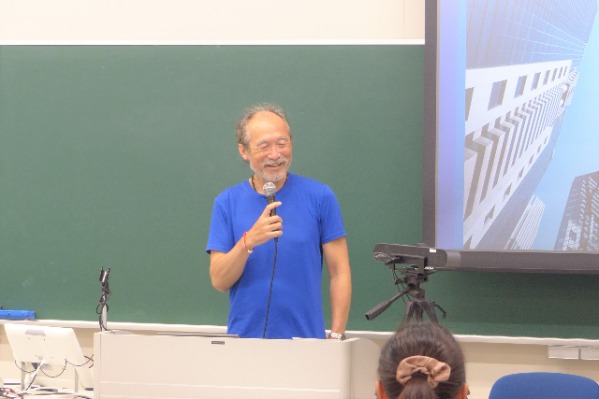


more
ProfessorYoichiro SATO, Professor (and ex-Dean) of College of Asia Pacific Studies at Ritsumeikan Asia Pacific University
Dr.Yoichiro SATO, Professor (and ex-Dean) of the College of Asia Pacific Studies at Ritsumeikan Asia Pacific University, was invited as a guest speaker on June 7, 2024, in the Professional Workshop course held by Dr. Astha Chadha. Dr. Sato has previously worked at Kansai Gaidai Hawaii College, University of Auckland, Asia-Pacific Center for Security Studies (US DoD, 2001-2009), and was a Senior Visiting Research Fellow at Yusof Ishak Institute of Southeast Asian Studies (2023).
Dr. Sato talked to the students about his academic career at prestigious universities in the US, New Zealand and Japan. His lecture focused on several security issues in the Indo-Pacific including:
1.Japan-US relations
2.Malacca Strait security
3.Japan’s policy towards South Pacific
4.Maritime security issues in the Indo-Pacific
The students engaged with the guest speaker, Dr. Sato, regarding career choices after graduation, and the possibility of continuing research in the graduate school. Dr. Sato also talked to students about how it is important to keep oneself updated with skills to maintain competitiveness in the job market.
2024.5.31

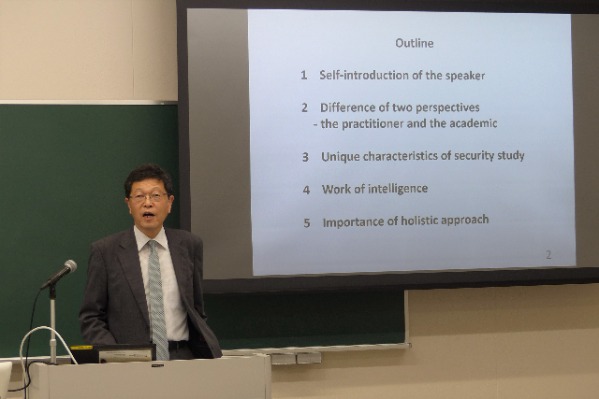
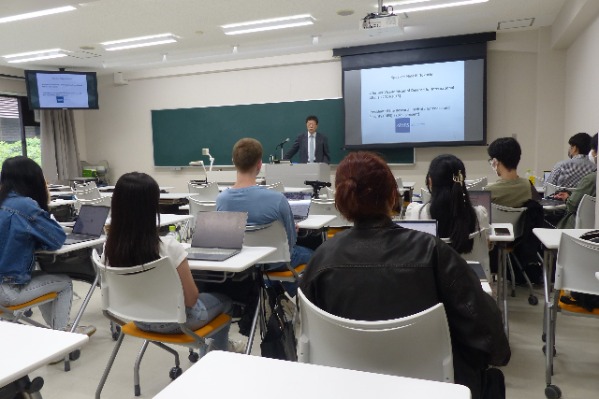
more
Report on the guest lecture (Professor Hideshi TOKUCHI, President of the Research Institute for Peace and Security (RIPS))
Professor Hideshi TOKUCHI, President of the Research Institute for Peace and Security (RIPS) and former Vice-Minister of Defense for International Affairs (2014-2015), was invited as a guest speaker on May 31, 2024, in the Professional Workshop course held by Dr. Astha Chadha.
Professor Tokuchi graduated from the Faculty of Law at the University of Tokyo, completed a master's program at the Fletcher School (M.A.L.D.), and served as the Ministry of Defense's Director-General for Operations Planning, Director-General for Human Resources and Education, Director-General for Accounting and Equipment, Director-General for Defense Policy, and Deputy Director-General for Defense Policy, before his current leadership position at RIPS since 2017.
Professor Tokuchi’s guest lecture explored security as a concept from academic as well as practitioner’s perspective. He emphasized on three main themes:
1. Unique characteristics of security studies in the US, Japan and other states
2. Work of gathering intelligence
3. Importance of holistic approach in international relations
The students engaged with the guest speaker, Professor Tokuchi, and asked him several questions related to his work in the government as well as his research. Prof. Tokuchi also advised students regarding job opportunities after graduation, the required skills to work for the government in security, and how to decide a career in international relations.
2024.05.27
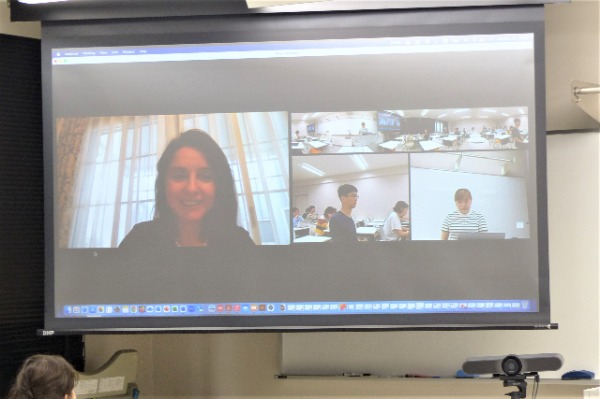

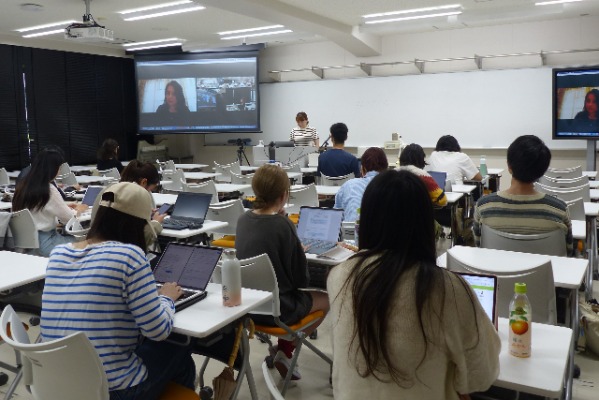
more
Report on the guest lecture (Dr.Ksenia Golovina, Lecturer Toyo University)
Dr. Ksenia Golovina conducted the guest lecture on the “Racism and Human Rights” topic. She specializes in Russian migrants in Japan and aspects of their lives, encompassing ethnic and racial issues. In her lecture, Dr. Golovina discussed historical roots of the research on race and ethnicity in the Western and Japanese contexts, provided a variety of case studies on racism, and introduced a scenario-based activity requiring students to apply knowledge learned in the lecture to understand the application of the social concepts learned in class.
At the beginning of the class, students were asked to formulate their own questions for the lecture, which would guide them through the lecture contents. Their questions address the conceptual understanding, social impacts, and personal experiences associated with racism and ethnocentrism. As such, students questioned processes allowing racism to persist and affect societies, in particular the influence of media, education, and historical policies on racial and ethnic identities; the place of mixed-race individuals within racial and ethnic contexts; the evolution of ideas about race and ethnicity in a globalized world; Japan’s position on minority inclusion; the ways race and ethnicity are used to promote political agendas and so on.
By the end of the lecture, students were asked to discuss what they learnt in class and what impacted them the most. Overall, many students mentioned gaining an insight into the historical construction of race by European scholars to justify enslavement and subjugation of African and other non-European peoples. This included the use of pseudoscientific methods and theories to claim the superiority of white people. Through the documentary “A Class Divided,” students observed the immediate and long-term psychological effects of racism, and how quickly and profoundly discriminatory practices can affect individuals, leading to resentment and division based on arbitrary characteristics like eye color. A significant takeaway was the understanding that race is not a biological reality but a social construct.
Many students acknowledged the importance of teaching children about the harmful aspects of discrimination, and led to discussions on how such education could be implemented in different cultural contexts, including Japan. Some students also reflected on their personal experiences with discrimination, particularly in the context of the COVID-19 pandemic. They discussed the relevance of historical lessons to modern society and considered how to adapt educational methods to address racism effectively. Overall, the lecture and discussions provided students with a deeper understanding of how race and ethnicity have been constructed and perpetuated, the severe impacts of racism, and the crucial role of education in combating discriminatory attitudes and behaviors.
2024.5.24
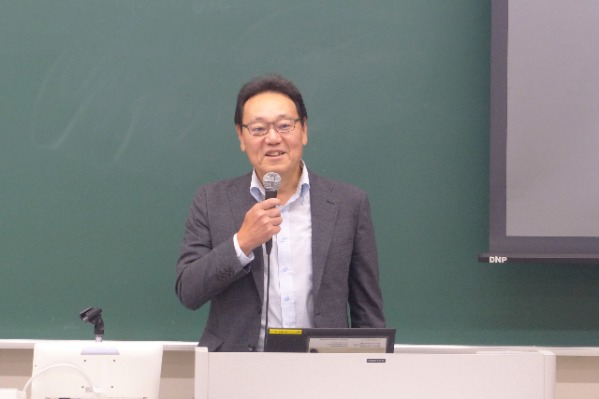
Report on the guest lecture (Mr. Hiroshi Iwayama, a senior manager from Japan’s DTS Corporation)
Mr. Hiroshi Iwayama, a senior manager from Japan’s DTS Corporation, was invited as a guest speaker on May 24, 2024 in the Professional Workshop (English) course held by Dr. Astha Chadha.

The guest lecture dealt with four main themes, related to the expertise of guest speaker in IT industry, Japanese banks as well as in managing new subsidiaries after a merger and acquisition transaction:
Differences in historical culture of IT system departments between Japan and overseas, especially in the United States.
DX in Japanese IT and banking sectors, including the steps from digitization, to digitalization to DX.
Challenges of choosing a career in Japanese IT or banking companies and the difficulties in working in foreign countries.
Impacts of economic crisis, natural disasters and pandemics on career growth and job opportunities.

The students engaged with the guest speaker, asking Mr. Iwayama about new digital technologies, complexities of acquiring companies, his personal experience of working in Japanese bank, and his experience working abroad for Japanese companies. Mr. Iwayama shared his insights about matching the desired career choice with the required skills, and how to develop technical skills while studying in the university.
The lecture ended with a group activity conducted by Mr. Iwayama and Dr. Chadha, for students to think about their desired careers and important skills to achieve their career goals.
more
2024.05.17

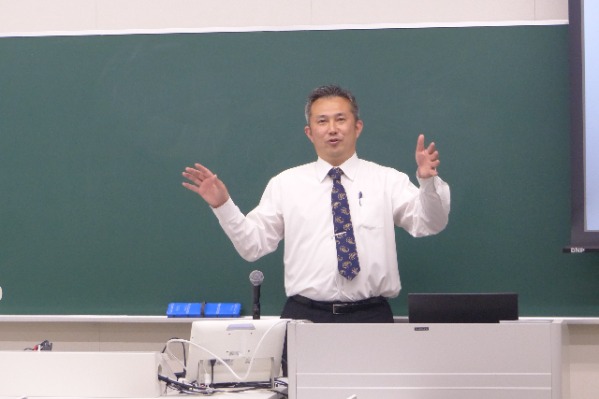

more
Report on the guest lecture (Mr. Kimihiro KITANI, Senior educational supervisor, Fukuoka Prefectural Office of Education, Kitakyushu Education Office)
Mr.Kimihiro Kitani, a senior educational supervisor from the Fukuoka Prefectural Office of Education,
Kitakyushu Education Office, interacted with the students from the Professional Workshop (English) course at the College of International Relations.
His lecture preceded an activity among students who had to learn to communicate without speaking, to demonstrate the usefulness of reading body language, and to understand each other despite the diverse socio-cultural backgrounds of the students.
The next part of the lecture focused on three main points:
1.finding a lifestyle that's right for you
2.current challenges in educational institutions in Japan;
3.education required in the future and how to pick a workplace appropriate for you.
Mr. Kitani explained how to deal with cases of bullying and stress among students, and how there are no wrong decisions regarding studies, because all knowledge is valuable.
In the final part of the interaction, students presented their career plans in short presentations before Mr. Kitani and the course instructor Dr. Astha Chadha. The students received feedback on their presentations, and discussed probable career choices based on their interests and skills.
2024.05.17

The Global Simulation Gaming course prepared ourselves for future roles in international relations.(Mutiara Nadine ANDREAPUTRI)
2024.04.19
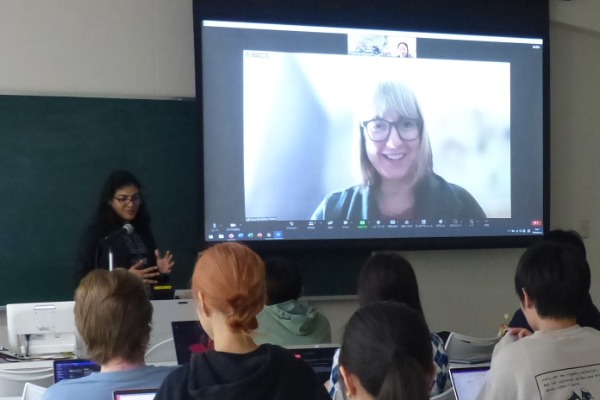
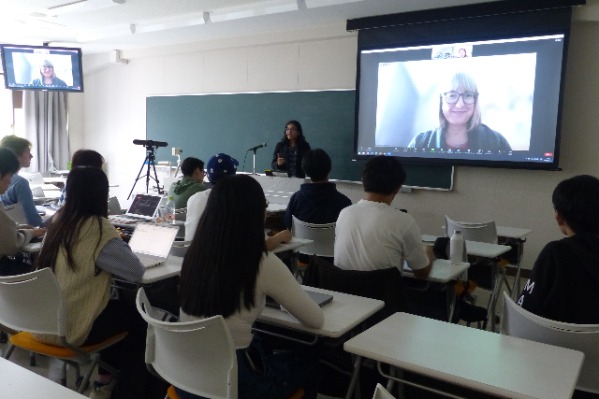
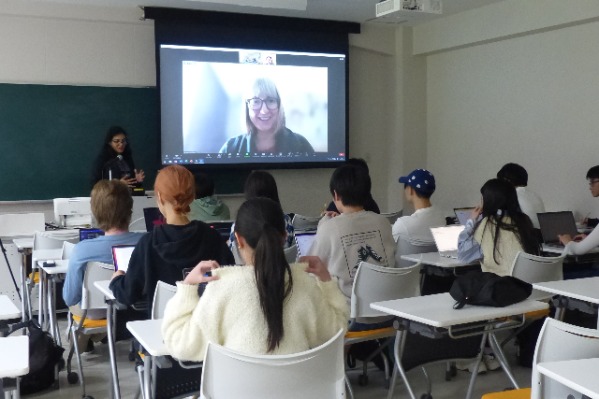
more
Report on the guest lecture (Maryruth Belsey-Priebe,Founder, Axxelerate; Director, Women Peace and Security, Pacific Forum Hawaii)
Maryruth Belsey-Priebe, a specialist in gender and climate change, was invited as a guest speaker on April 19, 2024, in the Professional Workshop course held by Dr. Astha Chadha, who has previously worked with the guest speaker at Pacific Forum’s Women, Peace and Security programme.
The guest lecture dealt with three main themes:
1.How to navigate the dream career in an ever-expanding pool of career choices and how to build expertise in newer fields such as climate change policy or human security and infrastructure, disaster response, gender, and peace etc.
2.How to ensure personal growth and motivation while working in a job of your choice, and how to never lose hope and patience if you encounter challenges at work, such as a devaluation in career, criticism at work or devastating situations.
3.Why diversity and inclusion are really important at workplace, and even more important as a mindset to succeed professionally and socially.
The students engaged with the guest speaker, asking Ms. Maryruth about why she chose the current job, her experience being an entrepreneur versus serving as a director of a programme at a think tank, how to develop technical skills while studying at the university, how to deal with mental health, and indicators for the right time to switch a career and how to build expertise in a new field.
Ms. Maryruth also provided mentorship advice to the students for career guidance in policy-related careers in think tanks and government, as well as in corporate policy-related research, and advised students to seek personal feedback from mentors.
The students then engaged in a mock disaster response activity where they took charge of different government departments during a natural disaster emergency simulation. The session ended with students presenting their gender-sensitive disaster response plans and strategies, followed by feedback from Ms. Maryruth Belsey-Priebe and Dr. Astha Chadha on each disaster response plan.